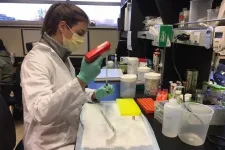(Press-News.org) Lenvatinib plus pembrolizumab yields better overall survival than single-agent sunitinib when given as first-line therapy in untreated patients with metastatic kidney cancer
The combination also improved progression-free survival and overall response rate
BOSTON - Patients with advanced kidney cancer, who received a targeted drug combined with a checkpoint-blocker immunotherapy agent had longer survival than patients treated with the standard targeted drug, said an investigator from Dana-Farber Cancer Institute, reporting results from a phase 3 clinical trial.
The survival benefit demonstrates that an immune checkpoint inhibitor together with a targeted kinase inhibitor drug "is important in the first-line treatment of patients with advanced renal cell carcinoma," said the authors of a study published in The New England Journal of Medicine today and simultaneously presented during American Society of Clinical Oncology (ASCO) 2021 Genitourinary Cancers Symposium. The senior author is Toni Choueiri, MD, director of the Lank Center for Genitourinary Oncology at Dana-Farber.
The phase 3 CLEAR study results showed significant benefits from the combination comprised of lenvatinib, an oral kinase inhibitor that targets proteins involved in the formation of blood vessels supplying a tumor, and pembrolizumab, a checkpoint inhibitor given by infusion that helps the immune system attack the cancer. Another group of patients received a combination of lenvatinib and everolimus, a drug that targets a protein, mTOR.
The comparison drug was sunitinib, an inhibitor that targets multiple kinases and has been the standard treatment in these patients with advanced kidney cancer, which carries a poor prognosis. However, standard-of-care options now include treatment with immune checkpoint inhibitors, either as a combination of two checkpoint inhibitors or a checkpoint inhibitor plus a kinase inhibitor. These combinations have achieved improved outcomes for advanced kidney cancer patients compared with sunitinib.
The results of the CLEAR study showed that those receiving the combination of lenvatinib and pembrolizumab not only had longer overall survival but also longer progression-free survival - the period before their disease worsened - and a higher response rate. In addition to lenvatinib plus pembrolizumab, the clinical trial also tested the combination of lenvatinib and everolimus, which is approved for patients with advanced kidney cancer whose disease progresses following sunitinib treatment.
The primary endpoint of the trial was progression-free survival (PFS). Both combinations proved superior to sunitinib alone: lenvatinib/pembrolizumab achieved a median PFS of 23.9 months vs 9.2 for sunitinib; PFS for lenvatinib/everolimus was 14.7 months.
The 24-month overall survival rate was 79.2% with lenvatinib/pembrolizumab, 66.1% with lenvatinib/everolimus, and 70.4% with sunitinib.
The confirmed objective response rate (percentage of patients whose disease shrank) was 71% with lenvatinib/pembrolizumab, 53.5% with lenvatinib/everolimus, and 35.1% with sunitinib. The rate of complete responses - total tumor shrinkage - was 16.1% in patients receiving lenvatinib/pembrolizumab, 9.8% in the lenvatinib plus everolimus group, and 4.2% in the sunitinib group.
"The rate of responses and complete responses, and the progression-free survival were the longest we have seen to date in a phase 3 combination of a targeted VEGF inhibitor and an immune checkpoint inhibitor," said Choueiri. The CLEAR trial is the last of the clinical trials that were launched to compare immunotherapy and targeted drug combinations to sunitinib, and sunitinib will not be the comparison drug in future trials because the combinations have proven superior in these advanced kidney cancer patients, said Choueiri.
Almost all patients in the CLEAR trial experienced some adverse events from treatment. The most frequent adverse events were diarrhea and hypertension. These side effects led to stopping the treatment in 37.2% of patients in the lenvatinib/pembrolizumab group, and dose reduction of lenvatinib in 68.5% of patients. "Although the combination of lenvatinib and pembrolizumab was associated with some notable side effects, these adverse events are often adequately managed" the researchers said.
INFORMATION:
The study was sponsored by Eisai, Inc., the discoverer of lenvatinib, and Merck Sharp & Dohme Corp., a subsidiary of Merck & Co. Choueiri is supported in part by the Jerome and Nancy Kohlberg Chair at Harvard Medical School. Choueiri's disclosures include receiving institutional research funds from AstraZeneca, Bayer, BMS, Cerulean, Eisai, Foundation Medicine Inc., Exelixis, Ipsen, Tracon, Genentech, Roche, Roche Products Limited, GlaxoSmithKline, Merck, Novartis, Peloton, Pfizer, Prometheus Labs, Corvus, Calithera, Analysis Group, Takeda as well as a consulting or advisory role for AstraZeneca, Alexion, Sanofi/Aventis, Bayer, BMS, Cerulean, Eisai, Foundation Medicine Inc., Exelixis, Genentech, Heron Therapeutics, Roche, GlaxoSmithKline, Merck, Novartis, Peloton, Pfizer, EMD Serono, Prometheus Labs, Corvus, Ipsen, Up-to-Date, NCCN, Analysis Group.
About Dana-Farber Cancer Institute
Dana-Farber Cancer Institute is one of the world's leading centers of cancer research and treatment. Dana-Farber's mission is to reduce the burden of cancer through scientific inquiry, clinical care, education, community engagement, and advocacy. We provide the latest treatments in cancer for adults through Dana-Farber/Brigham and Women's Cancer Center and for children through Dana-Farber/Boston Children's Cancer and Blood Disorders Center. Dana-Farber is the only hospital nationwide with a top 10 U.S. News & World Report Best Cancer Hospital ranking in both adult and pediatric care.
As a global leader in oncology, Dana-Farber is dedicated to a unique and equal balance between cancer research and care, translating the results of discovery into new treatments for patients locally and around the world, offering more than 1,100 clinical trials.
A test that monitors blood levels of DNA fragments released by dying tumor cells may serve as an accurate early indicator of treatment success in people in late stages of one of the most aggressive forms of skin cancer, a new study finds.
Led by NYU Grossman School of Medicine and Perlmutter Cancer Center researchers, the investigation looked at adults with undetectable levels of freely circulating tumor DNA (ctDNA) four weeks into drug treatment for metastatic melanoma tumors that cannot be removed surgically (unresectable). The study showed that these patients, all of whom had common genetic changes (BRAFV600 mutations) linked to cancer, were living ...
Peer-reviewed / Review, Survey and Opinion piece
To ensure an effective global immunisation strategy against COVID-19, vaccines need to be produced at scale, priced affordably, and allocated globally so that they are available where needed, and successfully rolled out.
Review of evidence includes a comparison of 26 leading vaccines on their potential contribution to achieving global vaccine immunity, and a new survey of COVID-19 vaccine confidence in 32 countries.
Having new COVID-19 vaccines will mean little if people around the world are unable to get vaccinated in a timely manner. ...
A new study from Washington University School of Medicine in St. Louis demonstrates that a liquid biopsy examining blood or urine can help gauge the effectiveness of therapy for colorectal cancer that has just begun to spread beyond the original tumor. Such a biopsy can detect lingering disease and could serve as a guide for deciding whether a patient should undergo further treatments due to some tumor cells evading an initial attempt to eradicate the cancer.
The study appears online Feb. 12 in the Journal of Clinical Oncology Precision Oncology, a journal of the American Society of Clinical Oncology.
While a few liquid biopsies have been approved ...
FOR IMMEDIATE RELEASE
Scientists have yet to answer the age-old question of whether or how sound shapes the minds of fetuses in the womb, and expectant mothers often wonder about the benefits of such activities as playing music during pregnancy. Now, in experiments in newborn mice, scientists at Johns Hopkins report that sounds appear to change "wiring" patterns in areas of the brain that process sound earlier than scientists assumed and even before the ear canal opens.
The current experiments involve newborn mice, which have ear canals that open 11 days after birth. In human fetuses, the ear canal opens prenatally, at about 20 weeks gestation.
The findings, published online Feb. 12 in END ...
A more aggressive approach to treating acne that marries the disciplines of psychology and dermatology is needed, according to two UC Riverside psychology researchers.
They also assert that women and people with darker skin disproportionately suffer from acne's psychological impacts.
"Acne is pervasive, physically harmless, and painless, so we all-too-often underestimate its impacts as the quintessential nuisance of adolescence and puberty," said UCR psychology professor Misaki Natsuaki, who authored the paper along with Tuppett Yates, also a UCR psychology professor.
The insinuation, including by developmental scientists, can be that hurtful monikers such as "pizza face" and "crater face" are best shrugged off.
But psychological ...
Using observations from NASA's Transiting Exoplanet Survey Satellite (TESS), an international team of astronomers has discovered a trio of hot worlds larger than Earth orbiting a much younger version of our Sun called TOI 451. The system resides in the recently discovered Pisces-Eridanus stream, a collection of stars less than 3% the age of our solar system that stretches across one-third of the sky.
The planets were discovered in TESS images taken between October and December 2018. Follow-up studies of TOI 451 and its planets included observations made in 2019 and 2020 using NASA's Spitzer Space Telescope, ...
Masks help protect the people wearing them from getting or spreading SARS-CoV-2, the virus that causes COVID-19, but now researchers from the National Institutes of Health have added evidence for yet another potential benefit for wearers: The humidity created inside the mask may help combat respiratory diseases such as COVID-19.
The study, led by researchers in the NIH's National Institute of Diabetes and Digestive and Kidney Diseases (NIDDK), found that face masks substantially increase the humidity in the air that the mask-wearer breathes in. This higher level of humidity in inhaled air, the researchers suggest, could help explain why wearing masks has been linked to lower disease severity in people infected with SARS-CoV-2, because hydration of the respiratory ...
A new study published in the journal Science Advances shows that Bantu-speaking communities in the Congo rainforest underwent a major population collapse from 1600 to 1400 years ago, probably due to a prolonged disease epidemic, and that significant resettlement did not restart until around 1000 years ago. These findings revise the population history of no less than seven present-day African countries (Cameroon, Central African Republic, Democratic Republic of the Congo, Republic of the Congo, Gabon, Equatorial Guinea, and Angola) and challenges the commonly held belief that the settlement of Central Africa by Bantu-speaking communities was a continuous process from about 4000 years ago until the start of the transatlantic ...
In research that may eventually help crops survive drought, scientists at Princeton University have uncovered a key reason that mixing material called hydrogels with soil has sometimes proven disappointing for farmers.
Hydrogel beads, tiny plastic blobs that can absorb a thousand times their weight in water, seem ideally suited to serve as tiny underground reservoirs of water. In theory, as the soil dries, hydrogels release water to hydrate plants' roots, thus alleviating droughts, conserving water, and boosting crop yields.
Yet mixing hydrogels into farmers' fields has had spotty results. Scientists have struggled to explain these uneven performances in large part because soil--being opaque --has thwarted attempts at observing, analyzing, and ultimately improving hydrogel ...
COVID-19 vaccine prioritization should prioritize those with advanced cardiovascular (CVD) disease over well-managed CVD disease, according to an American College of Cardiology (ACC) health policy statement published in the Journal of the American College of Cardiology (JACC). All CVD patients face a higher risk of COVID-19 complications and should receive the vaccine quickly, but recommendations in this paper serve to guide clinicians in prioritizing their most vulnerable patients within the larger CVD group, while considering disparities in COVID-19 outcomes among different racial/ethnic groups and socioeconomic ...


